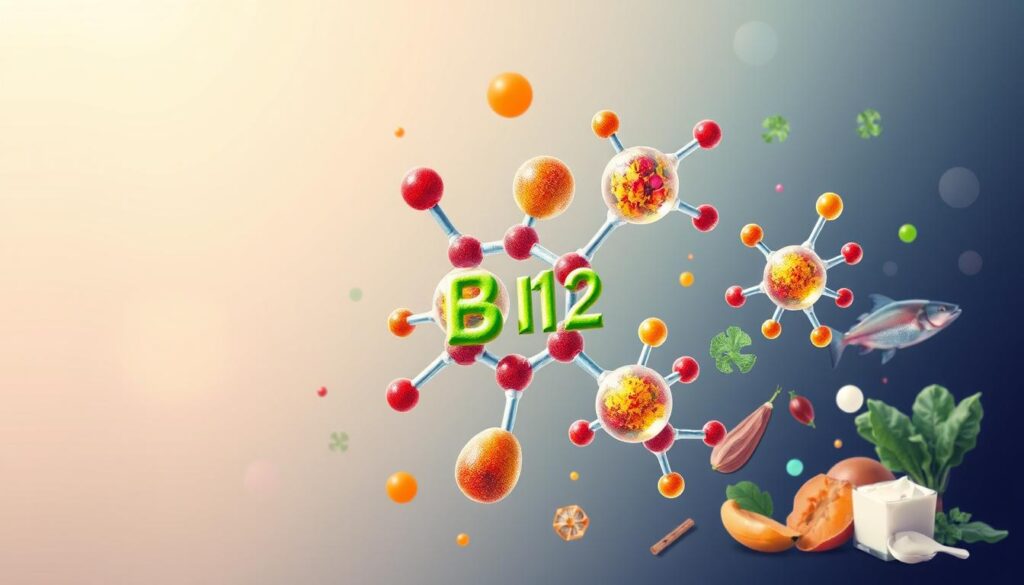Vitamin B12
Have you ever felt an inexplicable fatigue creeping into your daily life? The kind that makes even the simplest chores seem overwhelming? If so, you’re not alone. Many people experience this fatigue without realizing that a vital nutrient might be the underlying cause. Often overlooked, this essential vitamin, also known as cobalamin, plays a crucial role in overall well-being, from bolstering nerve function to supporting red blood cell formation. Fortunately, learning about its incredible health benefits, signs of deficiency, and top sources can empower you to take control of your health and vitality.
In the United States, nearly 20% of older adults struggle with a deficiency in this nutrient—a statistic that underscores the importance of understanding it. As we delve into the fascinating world of cobalamin, you’ll discover how this water-soluble compound contributes to your health and why ensuring adequate intake is vital for a fulfilling life.
Key Takeaways
- Vitamin B12, or cobalamin, is essential for nerve function and red blood cell formation.
- A significant percentage of older adults may be affected by Vitamin B12 deficiency.
- Dietary sources include animal products, with dairy offering higher bioavailability.
- Symptoms of deficiency can include fatigue, weakness, and cognitive issues.
- Regular intake of Vitamin B12-rich foods is crucial for overall health.
Introduction to Vitamin B12
The introduction to cobalamin, an essential nutrient, highlights its fundamental role in various vital functions, including DNA synthesis, neurological health, and red blood cell formation. This water-soluble vitamin is crucial for maintaining metabolic health and ensuring proper nervous system function.
Primarily obtained through animal products, this nutrient cannot be synthesized by the body. Therefore, individuals must rely on dietary sources or supplements to meet their needs. Common forms include methylcobalamin and 5-deoxyadenosylcobalamin, both of which are vital in numerous biochemical reactions within cells.
Understanding the importance of cobalamin is key to recognizing its impact on overall health. For instance, a deficiency can lead to conditions such as anemia, cognitive decline, and various energy-related issues. Awareness of its functions and significance promotes better health and helps prevent deficiencies.

Vitamin B12: Health Benefits, Deficiency Signs, and Top Sources
Understanding the health benefits of Vitamin B12 is crucial for maintaining overall well-being. This essential nutrient plays a significant role in various bodily functions, making it vital for everyone, especially older adults. Regular intake can help prevent deficiency signs that may lead to severe health issues.
Health Benefits of Vitamin B12
The health benefits of Vitamin B12 include its essential function in red blood cell formation, which helps prevent megaloblastic anemia. Vitamin B12 also supports proper neurological function, which is increasingly important as people age. Studies suggest that adequate levels of B12 could potentially reduce the risk of cognitive decline and depression. Additionally, Vitamin B12 helps maintain healthy skin, hair, and nails. Pregnant women should also ensure they receive enough B12, as it can prevent major birth defects in developing infants.
Signs of Vitamin B12 Deficiency
Recognizing the deficiency signs of Vitamin B12 is essential for early intervention. Symptoms can range from fatigue and weakness to more severe manifestations like pale skin, shortness of breath, and heart palpitations. Individuals may also experience neurological issues, such as numbness in hands and feet, memory problems, and mood swings. If left untreated, Vitamin B12 deficiency can lead to serious complications, including nerve damage and anemia. Ensuring a balanced diet rich in Vitamin B12 through sources like red meat, fish, eggs, and dairy is key to avoiding these health risks.
The Importance of Cobalamin
Cobalamin, commonly known as this essential vitamin, plays a critical role in maintaining various vital body functions. Its involvement as a cofactor in enzymatic reactions is crucial, particularly in DNA synthesis and the formation of red blood cells. This nutrient is also integral to the proper functioning and maintenance of the central nervous system.
Methylcobalamin, an active form of cobalamin, is particularly noteworthy for its role in converting homocysteine into methionine, an important amino acid necessary for numerous physiological processes. Maintaining adequate levels of this vitamin is vital, as deficiencies can lead to irreversible neurological damage and other health complications.
Given its importance, particularly for vulnerable populations such as the elderly, monitoring intake is imperative. Adults typically require about 2.4 mcg daily, with increased needs during pregnancy and breastfeeding. Understanding the significance of this nutrient can greatly enhance overall health and well-being.

Understanding Vitamin B12 Deficiency
Vitamin B12 deficiency is a pressing health issue that can arise from various factors, significantly impacting individuals’ well-being. The causes of Vitamin B12 deficiency often include inadequate dietary intake, particularly among those following strict vegan diets, certain health conditions like celiac disease, and absorption issues that commonly affect older adults. For example, pernicious anemia, an autoimmune disorder, can hinder the body’s ability to absorb this essential vitamin, increasing the risk of deficiency.
Causes of Vitamin B12 Deficiency
A notable portion of the population is at risk for Vitamin B12 deficiency. Approximately 6% of adults aged 60 or younger are affected, with the rate surging to 20% in older adults. Individuals following restrictive diets, especially vegans, require careful management to ensure adequate B12 levels, often necessitating supplementation. Furthermore, gastrointestinal issues or specific medications, such as proton pump inhibitors, can disrupt normal absorption, compounding the problem.
Symptoms of Deficiency
The symptoms of a deficiency in this essential vitamin can be serious and should not be overlooked. Individuals may initially experience fatigue, confusion, and depression. If left untreated, more severe neurological issues can develop, such as numbness and difficulty walking. Recognizing these signs early is crucial to prevent long-term health consequences. Regular screenings and awareness of dietary sources are key to addressing and preventing such deficiencies.











